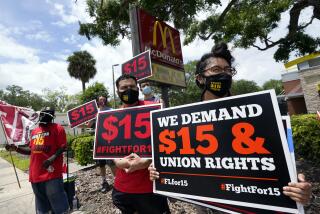Congress Examines 401(k) Plans
- Share via
WASHINGTON — Highlighting the risks that occur when employers heavily invest their workers’ retirement money in their own company, two women who worked more than 30 years for the Emporium department store in San Francisco told congressional Democrats on Monday how they lost almost everything when Carter Hawley Hale, the Emporium’s corporate owner, went bankrupt.
“One day I was on the way to my dream, and the next I was trying to recover from a nightmare--only the nightmare was real,” said Bernice Pon, who lost between $70,000 and $100,000 when the value of Carter Hawley Hale stock collapsed.
Edith Thomson, an Emporium gift wrapper whose retirement account shrank from $84,000 to $9,000, said, “The company wanted my money, so they took it--not with a gun, but with lies.”
The meeting was called to promote proposed legislation to forbid a company from investing more than 10% of its 401(k) retirement plan in its own stock. There are no limits on such investments for the increasingly popular 401(k) accounts, to which the worker makes a contribution that is matched in whole or part by the employer.
By contrast, federal law places a 10% ceiling on any single investment in traditional defined-benefit plans, which are financed by employers and provide fixed monthly payments at retirement.
“We’re sending a warning to American workers that federal pension law fails to protect 401(k) plans as it protects traditional pension plans,” said Sen. Barbara Boxer (D-Calif.), sponsor of the legislation to extend the 10% rule to retirement plans in which the investment decisions are controlled by the company’s management.
Her bill, with accompanying House legislation by Rep. Gary A. Condit (D-Ceres), “would stop the huge losses in 401(k) investments when the company sponsoring the 401(k) goes bankrupt,” she said.
It would “prevent corporations from forcing their workers to invest in employer stocks and employer real estate,” she said. “The premise . . . is simple: American workers should be protected from losing their jobs and their pensions at the same time.”
The pension meeting, at which Boxer and Condit were joined by Sen. Jeff Bingaman of New Mexico and Reps. Jim McDermott of Washington and Ken Bentsen of Texas, was the second in a series by Democrats to promote what they call a “families first agenda” of legislative proposals.
The financial record is mixed for companies heavily dependent on their own stock for 401(k) retirement programs. Workers at Sears, Roebuck & Co. and Procter & Gamble Co., for example, have benefited from big increases in the stock price.
However, many other companies, without giving their workers any choice of investments, have used their 401(k) plans as sources of easy money.
“The notion of having all of one’s retirement income in company stock is certainly more risk than most people would want to face,” said Howard Fluhr, president of Segal Co., a New York-based employee benefits and consulting firm.
The idea of linking company fortunes and the welfare of employees by investing in corporate stock is “sensible, but it is reasonable to be too concerned about risk in some situations,” Fluhr said.
Fluhr criticized the 10% limit proposed by Boxer as arbitrary.
More to Read
Inside the business of entertainment
The Wide Shot brings you news, analysis and insights on everything from streaming wars to production — and what it all means for the future.
You may occasionally receive promotional content from the Los Angeles Times.










